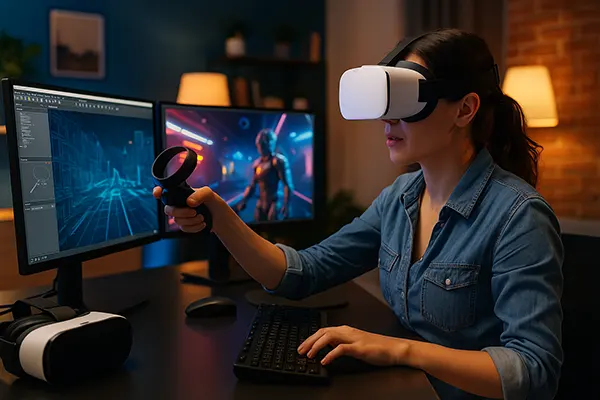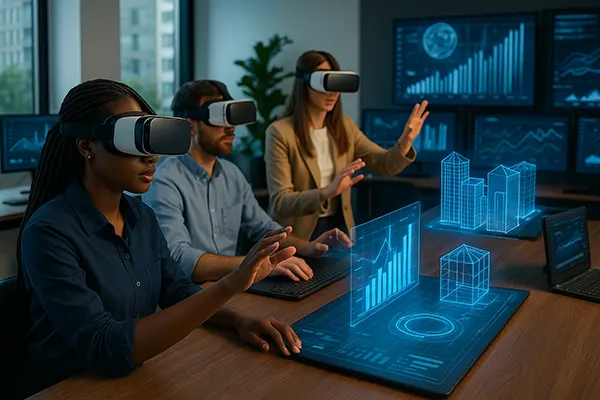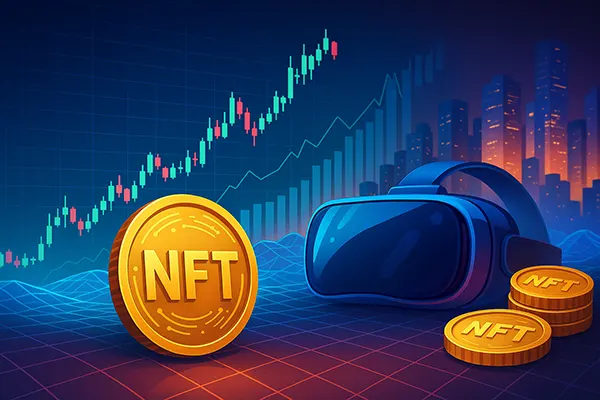
Earning in Virtual Reality: Creating VR Content, Games, and Events
The virtual reality industry has evolved into one of the most promising directions for remote income generation in 2025. Technological progress, widespread use of VR headsets, and the emergence of metaverse ecosystems have created a vast digital market for creators, developers, and event organisers. Understanding the key earning opportunities within this field allows professionals to transform creativity into a sustainable source of income.
Opportunities for Creators in Virtual Reality
Today’s VR ecosystem allows individuals to monetise their skills in multiple ways. Artists, 3D designers, and developers can sell interactive assets, environments, and avatars for metaverse platforms or custom virtual spaces. Educational institutions and corporations increasingly demand immersive training modules, offering stable projects for freelancers and creative studios alike.
Another thriving area involves developing cinematic experiences and short films specifically designed for VR headsets. This medium enables storytellers to create emotional, engaging content that draws audiences beyond traditional screens. Many creators now distribute their work on platforms such as SteamVR or Meta Quest Store, earning royalties and exposure simultaneously.
Furthermore, there is a growing demand for virtual architecture and interior design. Real estate companies and architects use VR to present future projects to clients, allowing designers to charge for realistic, explorable 3D environments. This niche combines artistic talent with technical precision, making it ideal for professionals who appreciate both aesthetics and innovation.
Building a Sustainable Creative Career in VR
To establish a reliable income in virtual reality, creators must treat their projects as professional ventures. Developing a personal brand, maintaining an online portfolio, and participating in VR exhibitions or digital art fairs significantly enhance visibility. Networking with VR studios and agencies can lead to recurring commissions and long-term collaborations.
Learning to use advanced tools such as Unreal Engine, Unity, and Blender is essential for competitiveness. Continuous skill upgrades, especially in motion design, animation, and user interaction, open doors to higher-paying contracts. Since VR evolves rapidly, staying informed about hardware updates and user experience trends ensures that creators deliver content compatible with the latest devices.
Finally, creators should adopt flexible business models, combining fixed-price projects with passive income sources like licensing and subscription-based content. This approach diversifies revenue streams and protects against market fluctuations, ensuring stability even during technological transitions.
VR Game Development as a Source of Income
The gaming industry remains one of the primary profit channels in virtual reality. Independent developers and established studios create immersive titles that redefine how players interact with digital worlds. By focusing on gameplay innovation and strong narrative elements, small teams can reach global audiences through VR distribution stores.
Monetisation models in VR gaming are diversifying. Apart from direct sales, developers increasingly use in-game purchases, premium upgrades, and advertising partnerships. Crowdfunding has also become a viable method for financing ambitious projects, allowing creators to test their concepts with real communities before launch.
Additionally, the integration of artificial intelligence has simplified content generation and gameplay balancing. AI-driven analytics now help developers understand player behaviour and optimise engagement, leading to longer play sessions and increased revenue potential. The combination of creativity and data-based insights defines success in 2025’s VR gaming sector.
Challenges and Strategies in VR Game Development
Despite its potential, the VR gaming field presents specific challenges. Production costs, testing requirements, and hardware optimisation demand careful planning. Developers must ensure compatibility with multiple devices such as Meta Quest, HTC Vive, and PlayStation VR2 to reach wider audiences.
To overcome these obstacles, collaboration between artists, coders, and sound designers is crucial. Effective project management tools like Jira or Trello help coordinate distributed teams working remotely. Early prototyping and community feedback remain vital for preventing costly post-launch adjustments.
Furthermore, developers who focus on accessibility—creating experiences that reduce motion sickness or support seated gameplay—can attract a broader demographic. This inclusive design philosophy not only enhances player satisfaction but also builds a positive reputation within the gaming community.

Organising and Monetising VR Events
Beyond games and digital art, virtual reality has transformed the event industry. In 2025, corporations, universities, and entertainment companies actively host conferences, concerts, and exhibitions inside VR environments. These events eliminate geographical limitations, allowing participants from all over the world to connect in real time.
Professionals who specialise in VR event planning can earn through consultancy, technical setup, and content creation. Demand for event managers who understand spatial design, interactive storytelling, and audience engagement is consistently rising. Combining creative production with logistical expertise positions organisers as indispensable partners for brands entering the VR space.
Additionally, virtual ticketing systems and NFT-based access models have introduced new monetisation formats. Event organisers can sell limited edition passes, offer branded experiences, or integrate sponsorships directly into VR spaces. The result is a sustainable ecosystem where creativity and commerce intersect naturally.
Future Outlook for VR Event Professionals
As hardware becomes more affordable and broadband networks expand, participation in virtual gatherings is expected to grow exponentially. Analysts predict that by 2027, VR event attendance will surpass traditional online streaming due to its interactivity and sense of presence. This growth promises consistent opportunities for content producers and event coordinators alike.
Professionals aiming to build long-term careers in this sector should invest in learning both creative and technical aspects—ranging from spatial audio design to VR user interface development. Mastery of these elements ensures the delivery of seamless, realistic experiences that clients value highly.
Ultimately, success in virtual event management depends on adaptability. The ability to merge innovation with practical business understanding enables specialists to respond quickly to evolving market trends and maintain competitiveness within the ever-changing VR landscape.




